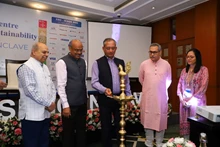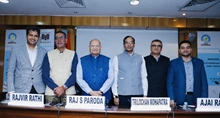
The /Nudge Foundation, a non-governmental organization (NGO), has initiated the Cisco Agri Challenge (CAC), a competition for start-ups, as part of its efforts to enter one crore farmers in the country with agri-tech solutions. CAC is organized by The/Nudge Foundation in collaboration with Cisco System, a global technology company based in the United States, and the Office of the Principal Scientific Advisor to the Government of India.
CAC will deliver a price network that will include farmer-centric solutions, according to Sudha Srinivasan, CEO of The/Nudge Foundation. “The remedies should be concepts that can be implemented on the field, such as creating a space and curating a ringside audience that can contribute,” she added. According to the CEO of a Bengaluru-based NGO, this would spur agricultural creativity and help farmers earn more money.
The/Nudge Foundation, which was created in 2017 as a start-up incubator, is aiming to attract the creativity of such creators. It has partnered with over 80 start-ups in the agri-tech and education sectors so far. Prof K Vijaya Raghavan, Principal Scientific Adviser to the Centre, unveiled the CAC in December 2018 with a prize pool of Rs 2 crore. In addition to the prize money, venture investors, corporate executives, knowledge partners, technology partners, and government consultants will assist the start-ups.
Rising economic profits
“The key goal is to attract creativity, funding, and public interest to thematic areas that are underserved. This will assist individuals in facilitating large-scale social reform. It is a kind of inspiration and momentum that encourages young people to dedicate their lives to addressing important issues,” Srinivasan explained.
The/Nudge Foundation's decision to initiate CAC is motivated by the fact that the agricultural sector's economic returns are less than 13%, despite the fact that it employs 57% of the country's population. As a result, poverty has remained stagnant, and the NGO sees agri-tech as a promising arena for reviving the Indian economy.
It has a $24.1 billion opportunity over the next five years, with $450 million invested in agri-tech start-ups in the first half of last year. According to her, CAC would spur farmer-centric creativity that will boost Indian agriculture's fiscal, social, and environmental outcomes. CAC got off to a good start, with 1,024 people signing up for the competition and 844 business ideas being presented. An distinguished panel, including Ashok Dalwai, CEO of the National Rainfed Area Authority, and Mark Kahn, co-founder of Omnivore, narrowed the field to the top 100 pitches.
“The jury has whittled the ranking down to the top 25. We would make a lot of academic analysis and know-how available to the public (for these short-listed ventures). “It would break down the barriers between academia and action,” she said. The short-listed companies would then receive "go-to-market funding," which includes everything from software to form a coalition for collective bargaining to precision agriculture and water supply management.
In the next 3 months, a lot of ground will be covered. In July, a new round of pitching and presentations will be held, with five grants of Rs. 15 lakh each being awarded. According to The/Nudge Foundation CEO, most of the start-ups in the running will cover the next crop cycle between July and January and show proof of their ideas' ability to educate one crore farmers.
“The challenge is to reach out to one crore farmers.” An distinguished jury would judge potential,” she added, adding that the winners will be chosen by a rigorous curation procedure that considered factors such as the merit of the project and the founding team. During the competition, the competing start-ups will either collect an equivalent amount of money or more. This will aid lucrative innovations in gaining a place in agri-investors' portfolios, as well as the process of attracting fresh talent and a large amount of new money.
Firms like Cisco, which will sponsor the entrepreneurs of its own staff, will also provide technology support to the start-ups. Universities with a global reputation, such as Purdue University in Indiana and Wageningen University in the Netherlands, will expand their engineering and other solutions, such as reducing fertilizer and pesticide use. Srinivasan continued, "Technology is another part of funding for start-ups."
Program for small-scale farmers
The/Nudge Foundation has founded the Centre for Rural Development (CRD), which has started working in Jharkhand with the aim of reducing poverty and addressing related issues such as healthcare among marginal and small farmers, who are the most disadvantaged in society. “This is built on a three-pronged approach: supplying farmers with food security, skill growth, and production assets. The foundation's chief executive officer said, "The asset of development is having farmers take on chickens, head of cattle, or goats."
The scheme, which focuses on the "ultra-poverty" category in 80 Jharkhand villages, has been in the works for nearly three years and has shown positive results. Families involved earn less than 20,000 dollars a year and are members of a "highly disadvantaged tribal tribe." This CRD campaign has supported over 5,000 people and 1200-plus households so far.
Women have largely been responsible for producing a healthy income by livestock rearing and small-scale farming. With the government's support, the project will be expanded to seven districts in Uttar Pradesh and scaled up over the next five years. The/Nudge Foundation hopes to enroll 2.5 million households in this scheme.
The foundation will also invest in and introduce agriculture help for small and marginal farmers to address issues like surplus crop production, planting higher-value crops, coping with weather and soil volatility, upgrading farm inputs, and ensuring proper pricing and market linkages. It will assist them in will their earnings. “Aspiring youth need more choices as a result of the Covid pandemic, which has resulted in reverse migration. Srinivasan added, "We will be announcing a very ambitious, big program in Uttar Pradesh soon."












